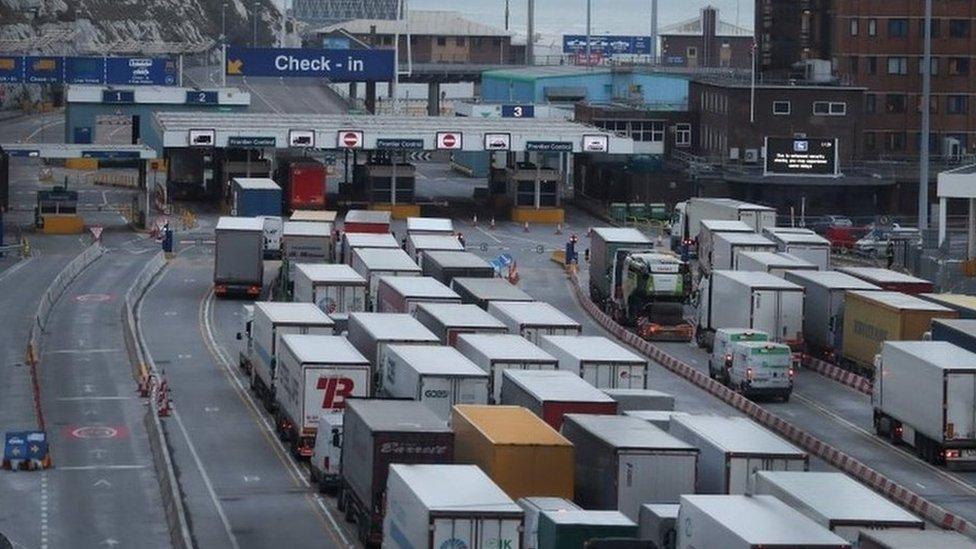Brexit: Operation Yellowhammer no-deal document published
- Published

A rise in public disorder, higher food prices and reduced medical supplies are real risks of leaving the EU with no deal, a UK government document says.
Ministers have published details of their Yellowhammer contingency plan, external, after MPs voted to force its release.
It outlines a series of "reasonable worst case assumptions" for the impact of a no-deal Brexit on 31 October.
Labour leader Jeremy Corbyn said the paper confirmed the PM "is prepared to punish those who can least afford it".
Michael Gove, one of Boris Johnson's senior cabinet colleagues who has been given responsibility for no-deal planning, said "revised assumptions" will be published "in due course alongside a document outlining the mitigations the government has put in place and intends to put in place".
However, ministers have blocked the release of communications between No 10 aides about Parliament's suspension.
Mr Gove said, external MPs' request to see e-mails, texts and WhatsApp messages from Dominic Cummings, Boris Johnson's chief aide, and eight other advisers in Downing Street were "unreasonable and disproportionate".
Publishing the information, he added, would "contravene the law" and "offend against basic principles of fairness".

Dominic Cummings was one of those named in the request to release communications
The government sought to resist the publication of the Operation Yellowhammer document, but lost a vote on the issue in the Commons on Monday, prior to the suspension of Parliament, so it was compelled it to do so.
The six-page document, dated 2 August and leaked to the Sunday Times last month, warns of disruption at Dover and other channel crossings for at least three months, an increased risk of public disorder, and some shortages of fresh food.
'Food price rises'
On food, the document says certain types of fresh food supply "will decrease" and "critical dependencies for the food chain" such as key ingredients "may be in shorter supply".
It says these factors would not lead to overall food shortages "but will reduce the availability and choice of products and will increase price, which could impact vulnerable groups".
The document also says low-income groups "will be disproportionately affected by any price rises in food and fuel".
The flow of cross-Channel goods could face "significant disruption lasting up to six months".
"Unmitigated, this will have an impact on the supply of medicines and medical supplies," it says.
"The reliance of medicines and medical products' supply chains on the short straits crossing make them particularly vulnerable to severe extended delays."
Among its other key points are:
Protests and counter-protests will take place across the UK
Lorries could have to wait more than two days to cross the Channel
Some businesses will cease trading
There will be a growth in the black market
Some providers of adult social care could fail
The document also warns of potential clashes if foreign fishing vessels enter British territorial waters on the day after the UK's departure and says economic difficulties could be "exacerbated" by flooding or a flu pandemic this winter.
The BBC's Chris Mason said some of the scenarios outlined were "stark", but ministers were insisting the paper was not a prediction about what will happen.
The document, which, until now, was categorised as "official, sensitive", is not an official cabinet paper. It dates from 10 days after Mr Johnson became prime minister.
Retailers said the document confirmed what they have been saying will happen in the event of a no-deal Brexit.
"Fresh food availability will decrease, consumer choice will decrease, and prices will rise," Helen Dickinson of the British Retail Consortium said.
And the British Medical Association described the Yellowhammer file as "alarming" and that it confirmed its warnings about no-deal, including the threat of medical supply shortages.
Labour's shadow Brexit secretary Keir Starmer said: "These documents confirm the severe risks of a no-deal Brexit, which Labour has worked so hard to block.
"It is completely irresponsible for the government to have tried to ignore these stark warnings and prevent the public from seeing the evidence."
MPs voted on Monday to order the release of all internal correspondence and communications, including e-mails, texts and WhatsApp messages, between nine No 10 advisers relating to Parliament's suspension.
But the government has said it will not comply with the MPs' request, citing potential legal breaches of data protection and employment rights.


This is not an "old" Yellowhammer assessment, as was claimed by the government in August.
It is from the latest internal no-deal planning, from August, from well within the time of Boris Johnson's administration.
The government hopes that its recent efforts will change some of the most concerning aspects of what is titled a "reasonable worst case assumptions" document, but they are yet to be able to make those changes.
Everything hinges on the core assumption made about disruption to freight traffic across the Channel - that over half would be stuck for up to two and a half days.
Those assumptions on trade flow have improved recently, but are still poor, and enough to have several highly concerning consequences, from fresh food supply, to stability in Northern Ireland, to social care providers and supplies of medicines for people and animals.
I have also been assured that a widely circulated version of this document, from the same day, had the phrase "base scenario".
It is somewhat confusing that there can be a base case of a worst case planning assumption.
In any event, these are the real, plausible short-term shocks from a no-deal Brexit.
The section on Northern Ireland is particularly concerning. In many respects it is incredible to have such a list of the plausible consequences of what is government policy.
It is not difficult to see why the government resisted its release. It is unlikely to improve the mood of an already sceptical Commons.
But it is really the first tangible, quotable, warts and all assessment of what Whitehall fears could be around the corner.

Mr Gove said the legal advice received by Mr Johnson before requesting the prorogation of Parliament was in the public domain after being disclosed as part of the ongoing court cases, but there was no justification for the "far broader" information being sought.
"To name individuals without any regard for their rights or the consequences of doing so goes far beyond any reasonable right of Parliament under this procedure.
"These individuals have no right of reply, and the procedure used fails to afford them any of the protections that would properly be in place.
"It offends against basic principles of fairness and the Civil Service duty of care towards its employees," he said.
He said it was ministers, not civil servants or special advisers, who were ultimately accountable to Parliament for decisions taken.
The request, therefore was "inappropriate in principle and in practice, would on its own terms purport to require the government to contravene the law, and is singularly unfair to the named individuals".
Correction 2nd October 2019: An earlier version of this story suggested the Yellowhammer document had referred to the potential risk of rioting; it has been amended to more closely reflect the paper's exact wording, which referred to protests and "a rise in public disorder and community tensions".